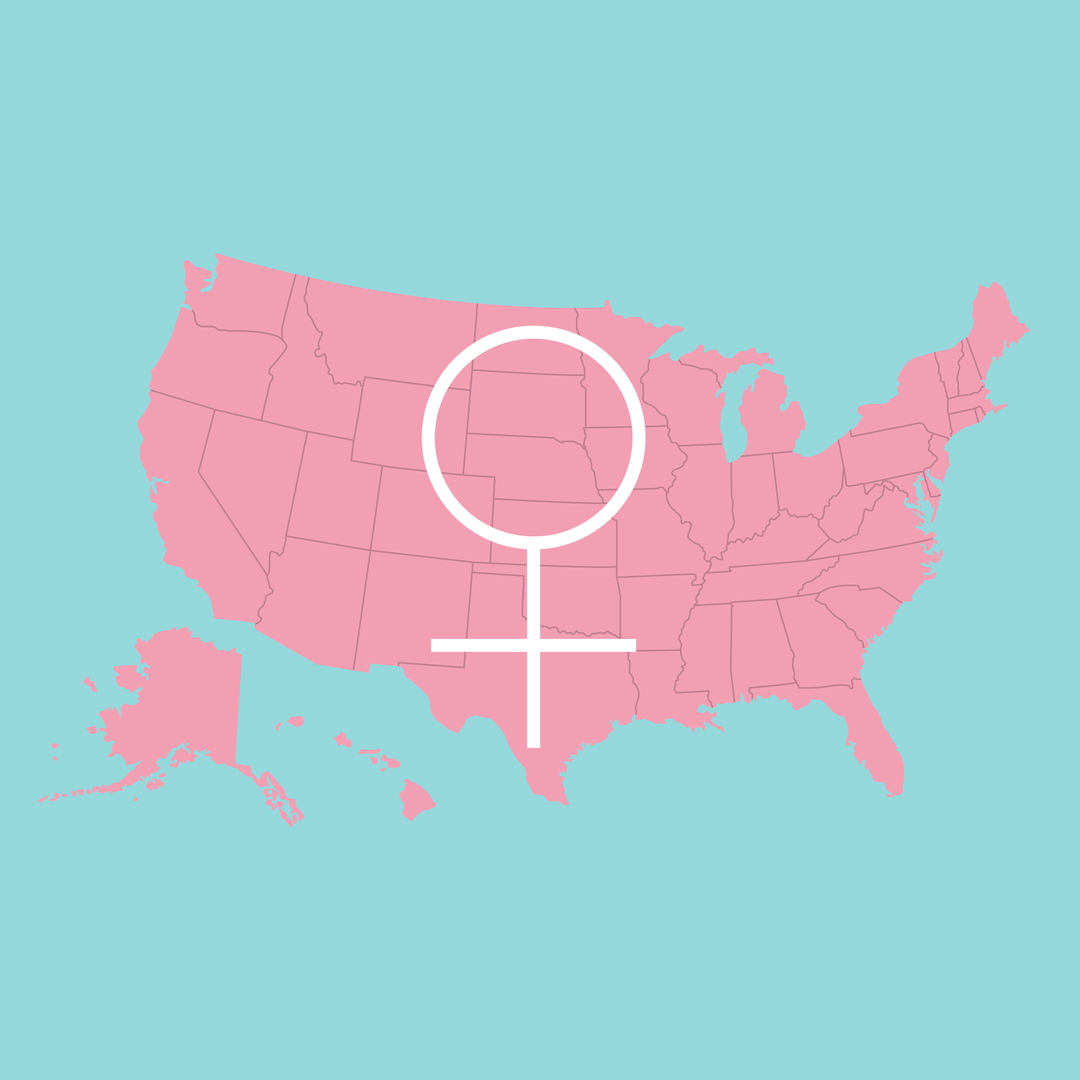Abortion is legal throughout the U.S. But after a certain point in the pregnancy, forty-three states prohibit your right to terminate. Do you know your local abortion laws?
By Tracy Collins Ortlieb
In the landmark 1973 case of Roe v Wade, the U.S. Supreme Court recognized a woman’s constitutional right to abortion, but maintained that states could prohibit the procedure once the fetus reached viability — the point at which a fetus is capable of sustaining life outside the womb — if those policies met certain requirements.
Since then, the Supreme Court has consistently reaffirmed the fundamental right to abortion, while also allowing states to determine new limits on a woman’s ability to obtain one. While most states abortion laws establish a legal window under which abortion may be performed, all allow the procedure to preserve the life and health of the mother, and most allow termination in the case of severe fetal anomalies.
Here are the current laws in your state as of June 2019:
Alabama — In May 2019, Alabama Gov. Kay Ivey signed a bill to make the procedure a felony in the state. The most restrictive ban in the nation, the new abortion bill outlaws nearly all instances of the procedure, and allows no exceptions for the products of rape or incest. Set to take effect in six months at the earliest, current law allows women to terminate prior to 22 weeks gestation. Alabama is home to just one abortion clinic.
Alaska — Alaska legislators last week introduced the “Life at Conception Act,” a bill that would ban legal abortion in the state and classify abortion as murder subject to felony assault/homicide charges. Until the bill is passed and enacted, abortion remains legal without restrictions in the state.
Arizona — Abortion is legal up to the 24th week of pregnancy.
Arkansas — Arkansas outlaws abortion after 20 weeks.
California — Abortion is legal up to the 25th week of pregnancy.
Colorado — Outpatient abortion is available up to 26 weeks.
Connecticut — Abortion is legal up to the 25th week of pregnancy.
Delaware — Delaware allows abortion up to the 20th week of gestation.
Florida — Abortion is legal up to the 25th week of pregnancy.
Georgia — In May 2019, Georgia Gov. Brian Kemp signed into law a “heartbeat bill” banning abortions after a fetal heartbeat can be detected — as early as six weeks into a pregnancy. Barring challenges, the measure is set to go into effect January 1. Until then, abortion remains legal up to 22 weeks of pregnancy.
Hawaii — Abortion is legal up to the 25th week of pregnancy.
Idaho — Abortion is legal up to the 25th week of pregnancy.
Illinois — Illinois abortion laws allow for the procedure up to the 25th week of pregnancy, while requiring parental notification for a minor’s abortion at least 48 hours prior to the procedure.
Indiana — Abortion is legal up to the 22nd week of pregnancy. After viability, an abortion is only allowed in Indiana to protect the health of the mother and must be performed in a hospital with a premature birth unit, if available, and in the presence of a second physician.
Iowa — In June 2018, the Iowa Supreme Court struck down the state’s unconstitutional 72-hour abortion waiting period. Abortion is legal in Iowa up to the 20th week of pregnancy.
Kansas — A ruling last month by the state Supreme Court found for the first time that the Kansas Constitution protects the right to an abortion up to 22 weeks of gestation.
Kentucky — This month, Kentucky lawmakers passed a so-called “heartbeat bill” that effectively prohibits abortions after six to eight weeks of pregnancy, when doctors can typically start detecting a fetal heartbeat. While struck down by a judge, the ban is expected to face a lengthy court battle. For now, abortion remains legal up to 22 weeks of pregnancy at Kentucky’s one abortion clinic.
Louisiana — Louisiana Democratic Gov. John Bel Edwards says he’ll sign an abortion “heartbeat bill” that comes to his desk should it clear the state Legislature. Introduced earlier this month, the bill faces one final vote in the state House. Abortion is currently legal up to the 20th week of pregnancy except for threats to a woman’s health.
Maine — Abortion is legal up to the 24th week of pregnancy.
Maryland — Maryland House Speaker Adrienne Jones said last week she will most likely push legislation to protect abortion rights in the Maryland Constitution. While legal up to the 25th week of pregnancy, Maryland allows exceptions for fetal abnormality.
Massachusetts — Abortion is legal up to the 24th week of pregnancy, with exceptions made for cases of maternal life and health.
Michigan — Abortion is legal in Michigan up to 19.6 weeks gestation following a mandatory 24-hour waiting period.
Minnesota — In May 2019, state lawmakers introduced provisions in the Senate’s Health and Human Services finance bill to make abortion illegal after 20 weeks. The procedure is currently legal up to the 25th week of pregnancy.
Mississippi — In March 2019, Gov. Phil Bryant signed a “heartbeat bill” banning abortion once a fetal heartbeat is detected. Like the Alabama law, the heartbeat bill does not allow exceptions for rape or incest. Mississippi has one abortion clinic which currently performs abortions up to 20 weeks of pregnancy.
Missouri — Missouri’s Governor Mike Parson signed a law in May 2019 banning most abortions in the state after the eighth week of pregnancy, one of the strictest bans in the U.S. It bans abortion in almost all cases, including when the pregnancy resulted from rape or incest, but allows exceptions when the mother’s life is in danger. Abortion is currently legal in Missouri up to the 25th week of pregnancy.
Montana — Abortion is legal up to the 25th week of pregnancy. Montana’s post-viability abortion restriction states that no abortion may be provided after viability unless necessary to preserve the woman’s life or health.
Nebraska — In May 2019, Nebraska Governor Pete Ricketts tweeted, “Nebraska is a pro-life state, and we support the brave pro-life champions and their work in Alabama and Georgia.” Ricketts later issued this statement: “(Fetuses) don’t have their own voice. So that’s why we’ve been congratulating other states that have been going out there and passing pro-life legislation,” he said. “We are going to continue to look for the pro-life legislation we can pass here in our state. We’ve passed a number of bills here, and we want to continue to do that.” Abortion is currently legal in Nebraska up to 22 weeks’ gestation.
Nevada — Nevada law allows mothers to have a doctor-induced abortion within the first 24 weeks of pregnancy. After 24 weeks, abortion in the state is legal if the mother’s life or health is in danger. Currently awaiting a vote by legislators, a new bill introduced here — the Trust Nevada Women Act— would modify state statute to eliminate requirements to verify the age of mothers seeking abortion and the requirement that doctors obtain written consent that would preclude coercion by a third party. The bill would also remove criminal penalties for providers of abortion-inducing drugs and allow non-doctors to perform abortion procedures.
New Hampshire — There are no restrictions to abortion in New Hampshire. While providers are prohibited from carrying out abortions on minors without giving 48 hours advance notice to parents, there is no requirement that parents consent.
New Jersey — New Jersey does not have any abortion restrictions.
New Mexico — New Mexico does not have any abortion restrictions.
New York — New York does not have any abortion restrictions.
North Carolina — Abortion in North Carolina is legal up to 20 weeks. A pregnant woman must receive state-directed counseling that includes information designed to discourage her from having an abortion, and then wait 72 hours before the procedure is provided; she must also undergo an ultrasound before obtaining an abortion, and the provider must offer her the option to view the image. The parent of a minor must consent before an abortion.
North Dakota — Abortion in North Dakota is legal up to 22 weeks’ gestation. A pregnant woman must receive state-directed counseling that includes information designed to discourage her from having an abortion, and then wait 24 hours before the procedure is provided. The parents of a minor must consent before an abortion.
Ohio — In April 2019, Ohio lawmakers “enacted the “Human Rights Protection Act,” outlawing abortions as early as five or six weeks into a pregnancy. While the bill does include an exception to save the life of the woman, it has no exceptions for cases of rape or incest. Until the law takes effect in July, abortion remains legal in Ohio up to 20 weeks of pregnancy.
Oklahoma — In April 2019, Republican Greg Treat, leader of the Oklahoma Senate, introduced legislation — modeled after existing laws in a handful of states — that would “trigger” a state ban on abortion and make it a felony if Roe v. Wade were overturned. Currently, abortion in Oklahoma is legal up to the 22nd week of pregnancy.
Oregon — Oregon protects the right to abortion throughout the entire pregnancy.
Pennsylvania — Abortion is legal in Pennsylvania up to the 24th week of gestation, although the patient must receive state-directed counseling and wait 24 hours before the procedure is provided.
Rhode Island — Abortion is legal in Rhode Island up to the 24th week of pregnancy.
South Carolina — Gov. Henry McMaster has pledged to sign the state’s pending “fetal heartbeat” bill when it reaches his desk. Abortion is currently legal in South Carolina up to 22 weeks’ gestation.
South Dakota — A “trigger law” in South Dakota means abortion would be banned if Roe v. Wade were to be overturned. Abortion is legal up to 22 weeks of pregnancy, but state law mandates state-directed counseling and a 72-hour waiting period.
Tennessee — After an initial appointment, there is a 48-hour waiting period before an abortion can be performed. Abortion in Tennessee is illegal after 20 weeks.
Texas — In May 2019, the Texas Senate passed a bill that would ban abortions on the basis of the sex, race or disability of a fetus, and criminalize doctors who perform what opponents call “discriminatory abortions.” Abortion is currently legal in Texas up to 22 weeks of pregnancy.
Utah — In 2016, the Utah Legislature passed a bill in 2016 that requires doctors to administer anesthesia or painkillers for a fetus before any abortion at 20 weeks gestation or later — the first law of its kind in the country.
Vermont — Vermont has no legal restrictions on abortion.
Virginia — Abortion is legal in Virginia up to 25 weeks. Post-viability, the procedure can be performed if the pregnancy threatens the mother, is a result of rape or incest or involves fetal impairment.
Washington — Abortion in Washington State is legal up to 25 weeks’ gestation.
West Virginia — A “trigger law” in West Virginia means abortion would be banned if Roe v. Wade were to be overturned. Abortion is legal up to 22 weeks of pregnancy, but state law mandates state-directed counseling and a 72-hour waiting period. Patients can receive an abortion up to 20 weeks during their pregnancy at the state’s single abortion clinic.
Wisconsin — While abortion is legal in Wisconsin up to 20 weeks of pregnancy, lawmakers recently introduced a so-called “born alive” bill addressing an extremely rare occurrence in which a baby is born alive during a failed abortion attempt. Under the bill, abortion providers would be required to care for babies that survive an abortion. Failure to do so would be a felony punishable by up to six years in prison and a provider convicted of killing such a baby would face life in prison.
Wyoming — Abortion is legal in Wyoming up to 25 weeks of pregnancy.




